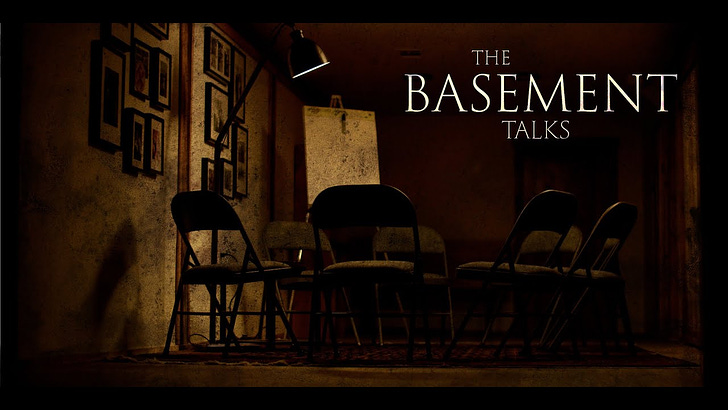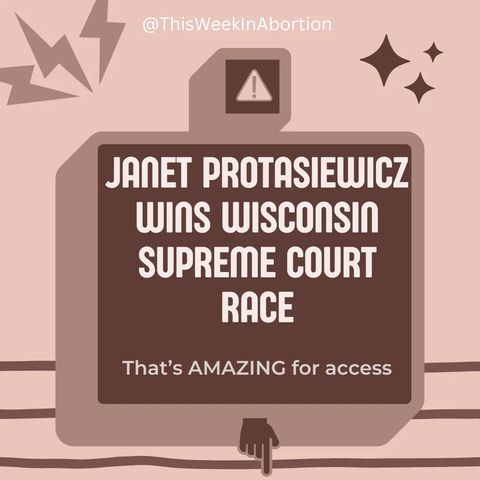This Week in Abortion - Wisconsin election and Mifepristone
A collection of good reads, events from the week, and policy insights.
Welcome back to your weekly roundup of good reads, legal updates, and legislative tracking on abortion. This week’s news covers the Wisconsin election and the ruling on the abortion pill - mifepristone - that finally came out of Texas.
Good Reads (and films)
A new film called “The Abortion Talks” has a virtual screening on April 17th. We will be watching and are open to hosting a post-screening conversation if there is interest. Let us know!
You can likely feel that the political environment around abortion access is intense. A few pieces came out this week highlighting strategies and debates politicians are using to capitalize on this anchoring. First, a piece from WeAreIowa highlights the widening division of states since Roe was overturned. Politico wrote about the ongoing debate in Democratic circles about whether ballot initiatives should push for the same or more than what was in Roe v. Wade. Meanwhile, the NYTimes featured an interesting read about policymakers who run on abortion even when their office has no jurisdiction on the topic.
Have you heard of ectogenesis? Wired lays out how artificial wombs might fit into the abortion conversation. TLDR: access-focused states should start taking up legislation to regulate this now to prevent some Handmaid’s Tale episodes from becoming reality.
Remember that law Arkansas passed allowing it to build a monument to abortion on state property? Tennessee passed a similar law five (5) years ago and thus far has received zero donations for its construction. Given Arkansas’ Ten Commandments’ monument (note, those monument folks at the Satanic Temple were all over that!), we can hope but are not optimistic their abortion monument will have a similar fate as Tennessee’s did.
Events of the Week
The Wisconsin Supreme Court race win by Judge Janet Protasiweicz is a top event this week. Lawsuits against the 1849 law banning abortion that is currently in effect will likely go all the way up to the top and there is reason to be hopeful this shift in power will benefit the access advocates. Knodl’s win in the (very close) special election gives a supermajority to republicans in the State Senate. This doesn’t give the legislature automatic veto power, but it’s pretty close with only two seats needed in the house. Knodl’s win makes Judge Protasiewicz’s landslide both more impressive and more necessary!
North Carolina state representative Tricia Cotham switched parties from Democrat to Republican (yes, in the middle of session…we have lots of thoughts on this unrelated to abortion). The House GOP now has a veto-proof majority but our hope is that it won’t mean much for abortion access given her strong support of reproductive rights in the past.
New Mexico signed a bill protecting abortion providers from nefarious actions from other states, providing some relief against bills their neighboring states are trying to pass.
The Kansas legislature was busy passing some scary bills requiring physicians to tell patients abortion pills can be reversed (literally requiring doctors to provide false medical information) and allowing prosecutions of medical professionals who don’t care for fetuses in “live birth” abortions (a term that gets folks riled up but is not an actual medical thing). Both are likely to be vetoed by the Governor.
Michigan Governor Gretchen Whitmer got some good press this week when she formally repealed the state’s 1931 abortion ban from the state’s lawbooks, declaring “who would like to watch me slay a zombie?”
Legal Updates
Texas Judge Matthew Kacsmaryk finally issued his ruling on the abortion pill mifepristone, suspending FDA approval of the drug. The ruling will not take effect for a week, and the Biden administration appealed the ruling within three hours. Still, it’s bound to cause some upheaval, adding to the state of legal chaos across the country. Remember, misoprostol alone is effective as an abortion medication and providers may start to prescribe it more in order to avoid the legal confusion around mifepristone.
On the same day as Kacsmaryk issued his ruling, a Judge Thomas O. Rice in Washington issued a ruling that should essentially protect access in 17 states and D.C. NPR discusses how the two conflicting rulings may play out. Email us with your bets on the odds that Rice timed his ruling to drop the same day as the Texas case.
Planned Parenthood of Utah is challenging the state’s recent ban on abortion clinics. Planned Parenthood operates three of the four clinics in the state. They are asking for a stay on implementation until the court rules on the legality of the ban.
A lot happened in Minnesota courtrooms this week. First, the Minnesota Court of Appeals rejected an abortion challenge bid further fortifying access in the State (yay!). On the other side, a new lawsuit filed by Pro-Life Action Ministries claims ordinances ensuring people can enter abortion clinics without obstruction are a violation of free speech. We feel like we’ve been here before but are curious if they are employing any new arguments that makes them believe they will get a different outcome.



